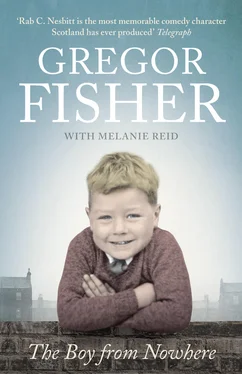Some family secrets remain buried forever, with the complicity of everyone involved. Others, however, are shared at a certain point. It was inevitable that there would come a time when Gregor would question why his mother was so old and where, if she hadn’t given birth to him, had he come from, that day in the snow? Given the bond between them, this was always going to carry a lot of emotional freight. When it did happen, it was devastating, leaving both in distress. This was the only time Gregor ever rejected his mother; shut her out from him, closed the door on her love.
It was during one of those scones-and-jam family suppers when the mood had lifted because Mr Leckie had gone to work. There must have been a christening in the family because it was the subject of discussion. Churches, godparents, babies … Cis, Margaret and Una chatting.
Out of the blue, Gregor, unthinking, opened his mouth.
‘Where was I christened?’
An awkward, loaded silence fell over the room; an ear pop of tension. Sensing something, and never slow at coming forward, Gregor repeated his question. Immediately the subject was changed. One of his sisters offered him another scone, his mother chipped in with a change of subject. ‘Uh-oh,’ he thought. Preoccupied with himself, like all 14-year-olds, he picked up on the evasion, the awkwardness in the room. There was a mystery, some secret being withheld from him. Something that pertained to him, which everyone else was party to.
Nothing more was said and he went to bed as usual. Then came a knock on his door – an unusual occurrence because it was the sort of household where no one locked or knocked on doors. His mother came into the room.
‘You’re adopted,’ she said.
She stood there awkwardly, looking at him, unsure what to do next. It was the classic, blunt-edged West of Scotland way of doing things. In the 1960s no one was schooled in communication and child psychology; no one read manuals on how to discuss sensitive issues with children. Unlike today, there weren’t numerous books and websites on how to deal with an adopted child. There were few social workers, hoops to jump through or guidelines to follow. What followed was a moment of most extraordinary drama. Cis was not given to physical demonstrativeness, but she reached out with her hand and patted her beloved son on the head.
Not once. Twice.
A single pat was unheard of. Two was a sign of almost uncontrollably high emotion. Cis was obviously as moved as she was uncomfortable.
‘We look after you now, you know. We wanted you, we love you,’ she muttered.
And she turned and left the room.
We’re on our first expedition together, Gregor Fisher and me. A most unlikely Johnson and Boswell, more Dastardly and Muttley. It must surely be a comedown for him – usually he’s in a Mercedes. This time he’s in my silver VW Polo; a man both cheery and wary, a passenger I barely know. I wonder what he’s thinking. I know more about his ancestors than him, the living flesh and blood. Some months ago he had approached me out of the blue, through a mutual friend, because he wanted, finally, to pin down the story of his life.
We’re heading up the hill into the village of Neilston, me driving, him navigating.
Gregor is telling me about what happened when Cis died, in 1983.
‘She left me some money.’
He is silent for a bit.
‘I’ll never forget it – it said in her will, “I leave so much to my daughters and I leave so much to Gregor Fisher, who lived with me.”’
His voice catches. I suddenly realise he’s crying.
‘Why did they have to say that? “To Gregor Fisher, who lived with me”.’
Tears are running down his cheeks. She was his mum but he wasn’t her son. Even beyond the grave he wasn’t allowed to be her son. The authorities wouldn’t even give him that comfort: a rejection from the woman who never rejected him.
‘It’s just legal language,’ I say, desperate to console him. ‘Bloody lawyers, they have to say these things just so. A technicality.’
He’s wiping his face with a hankie.
‘I know that, I just can’t forget it,’ he says. ‘Gets me every time.’
Конец ознакомительного фрагмента.
Текст предоставлен ООО «ЛитРес».
Прочитайте эту книгу целиком, купив полную легальную версию на ЛитРес.
Безопасно оплатить книгу можно банковской картой Visa, MasterCard, Maestro, со счета мобильного телефона, с платежного терминала, в салоне МТС или Связной, через PayPal, WebMoney, Яндекс.Деньги, QIWI Кошелек, бонусными картами или другим удобным Вам способом.












